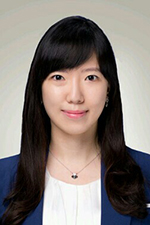
This year, we’re on the lookout for department members who are working to help us support our commitment to change by seeking equity, social justice, and anti-racism.
We asked Seungwon Chung, assistant professor in the quantitative methods in education program and member of the Department of Educational Psychology’s Diversity Committee, to tell us a bit about how the work of the Diversity Committee connects to her research and what inspired her to get involved.
What made you decide to get involved in the Diversity Committee?
Being a foreigner, I was not very familiar with the racial issues in this country other than what I had learned through history books during my teenage years in another country. I have been wanting to learn more about the current racial struggles. My husband, went to college in St. Louis, a city rich with history of racial struggles, has talked to me a lot about racism in this country. When Professor delMas reached out to me about the possibility of serving on the diversity committee for 2020-2021, I thought this was the right opportunity for me to learn and possibly contribute at the same time. Only within two weeks of joining, George Floyd was murdered in this very city leading to nationwide and worldwide protests. Participating in the committee felt all the more imperative. I have been learning a lot and becoming more racially aware ever since.
How does the Diversity Committee work connect to the research you do?
As a quantitative researcher, my research theme is precise measurement of
abilities and traits. Proper measurement tools are important for fair and equal opportunities to access quality education and, by extension, for promoting diversity whether in terms of race, socioeconomic status, or disability. For example, I am currently working to develop methods for fair scoring of students with disability who take different test forms from the general population. Without a fair method for linking different test forms, the abilities of special population can easily be underestimated, and by quite a large margin at that, sidelining their rightful place in education. These methods are broad enough to be generalized to other contexts and other types of special population that is underprivileged, in various ways. Underprivilegedness is closely tied with racial discrimination, so hopefully one day my research efforts can be extended to that arena as well.
What has the committee been working on since you joined?
The George Floyd killing, which happened in this very town immediately after I had joined, pushed the committee to take more urgent and tangible actions towards the anti-racism. The committee is implementing plans to infuse diversity more deeply into the various levels of the department structure in both short and long terms. Our goal going forward is to increase BIPOC and underrepresented people’s presence in the department to empower them in the long run, honestly monitor our progress.
What keeps you inspired to work on the Diversity Committee?
For one, I feel that I have a lot more to learn. How racism is woven into the fabric of this society and individuals’ mantra is so much more complex than I had imagined. It will be an ongoing struggle for a long time to come, and it requires an active fight for anti-racism. Ultimately, I think that overcoming, or at least relieving, racism and diversity issues will help make more society more healthy at a fundamental level. The dedication of our wonderful committee members inspires me to continue to do the work.



